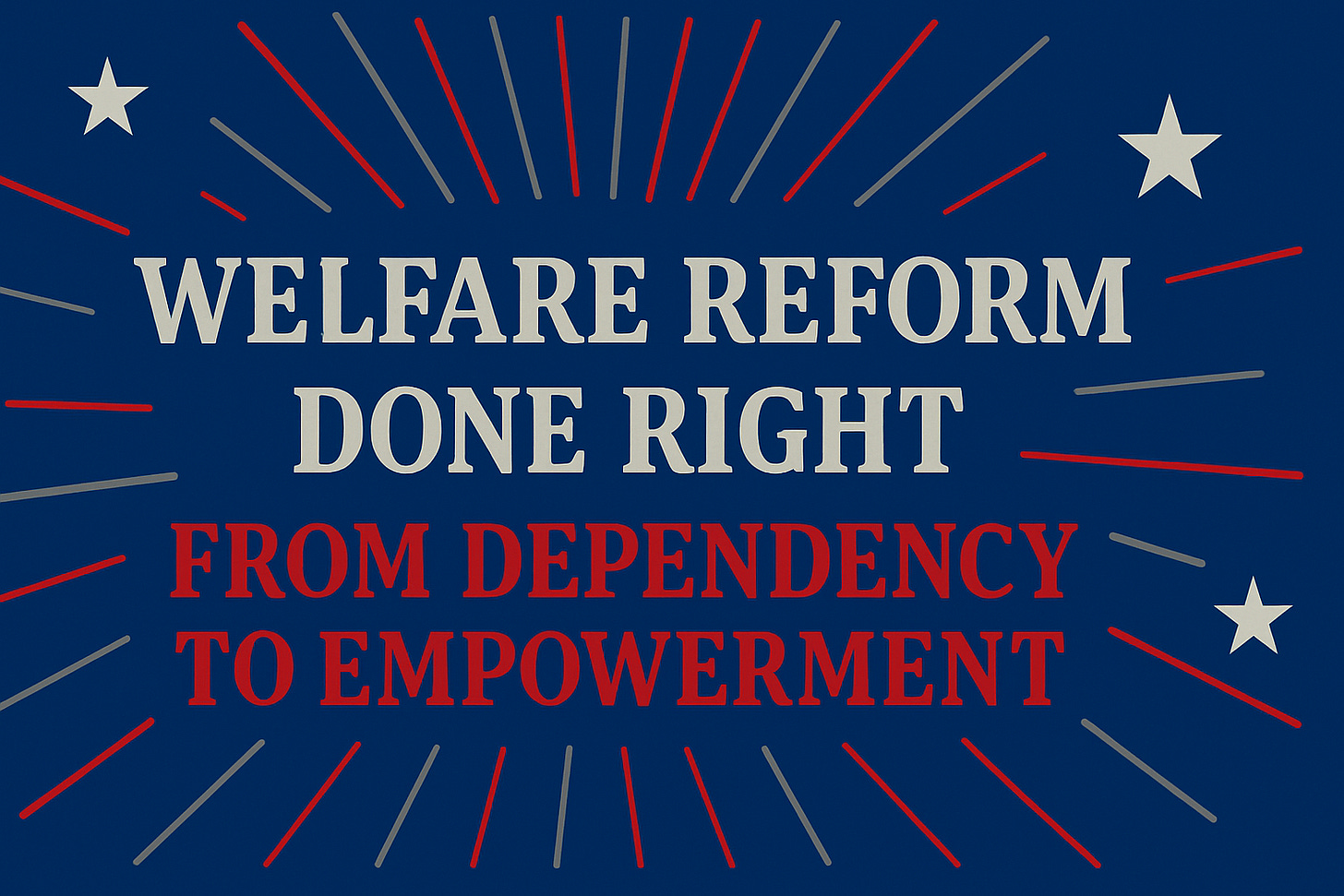Right Welfare Reform? From Dependency to Empowerment
Welfare Reform Done Right: From Dependency to Empowerment
Hello Friends!
America has spent more than $25 trillion (inflation-adjusted) fighting poverty since President Lyndon Johnson declared a “War on Poverty” in 1964.
The result?
A poverty rate that has barely budged or was already improving before forced massive divergent spending and redistribution on flawed programs. Families trapped in cycles of government dependence and policymakers still tinkering with the edges. They argue over how much in welfare payments do recipients get rather than asking the more important question: how do we help people thrive?
The latest poverty data show the cracks: millions remain stuck, even as government spending on welfare programs continues to climb. For too many, assistance has turned into a trap—where the marginal tax on returning to work is so high that staying on welfare seems rational. That’s not compassion. That’s policy failure.
Why the War on Poverty Failed
The central problem is design. Instead of fostering upward mobility, most programs lock people into dependency by phasing out benefits quickly when they return to work. This creates a punishing tradeoff: work more, lose benefits. For a single parent weighing childcare costs, transportation, and reduced benefits, working can actually mean taking home less.
Worse, well-meaning add-ons—from regulating what low-income families can buy with SNAP to new bureaucratic hoops—only pile on frustration without changing incentives. These regulations pretend to “help” but mostly signal distrust of the very people the programs claim to serve.
The unintended consequence?
Generational cycles of dependency. Families learn to navigate welfare systems, not labor markets. Children grow up without seeing parents steadily employed. Communities lose the dignity and prosperity that come with meaningful work.
A Better Way: Empowerment Accounts
There’s a smarter path forward: Empowerment Accounts.
As I’ve written and spoken about with the Alliance for Opportunity and in conversation with the Sutherland Institute, these accounts would consolidate welfare benefits into a single, flexible platform that recipients could use for their specific needs—while facing the right incentives to transition back to work.
Here’s why it works:
Flexibility: Families choose how to allocate resources—whether for childcare, training, transportation, or basic needs.
Accountability: Payments are conditional on progress toward self-sufficiency, with work requirements that actually help.
Simplicity: Dozens of overlapping programs are replaced with a single system, reducing waste, fraud, and bureaucratic overhead.
Incentives: Benefits taper in a way that encourages work, rather than penalizing it.
This flips the focus from “how much can you get” to “how fast can you succeed.”
Direct and Indirect Costs of Dependency
We often talk about the fiscal price tag—billions in taxpayer dollars funneled into programs that don’t reduce poverty. But the indirect costs are even higher:
Lost productivity when millions of work-capable adults are sidelined.
Higher crime and instability in communities with entrenched dependency.
Declining family formation and cultural cohesion as government replaces community and church-based support.
Dependency is expensive not just for taxpayers, but for society itself.
The Case for Reform Now
The case for reform is urgent. Policymakers keep layering on rules—like banning “junk food” purchases with SNAP—as if micromanaging diets will solve poverty. That’s a distraction. The real question is: how do we transition people back into work, restore dignity, and let families prosper?
Empowerment Accounts are not just about saving money—they’re about unleashing potential. They recognize that the goal of welfare should be temporary assistance, not permanent dependency. They return the focus to work, responsibility, and opportunity.
Conclusion
Compassion isn’t measured by how much government spends. It’s measured by whether people actually escape poverty. After decades of stagnant results, it’s time to admit the War on Poverty was lost—and chart a new course.
We need welfare that empowers, not entraps. Programs that encourage work, not avoidance. Policies that trust families to make decisions, not bureaucrats to micromanage them.
If we want families and communities to flourish, welfare reform must move away from dependency and toward prosperity through empowerment.
Listen & Learn More:
True compassion is not handing out more benefits. It’s equipping people to leave welfare behind for good. Empowerment, not dependency, is the way forward.

